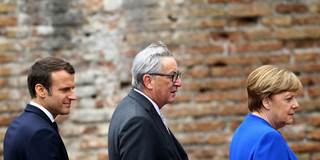Despite their differences, British Prime Minister Theresa May, French President Emmanuel Macron, and German Chancellor Angela Merkel have one thing in common. All are building a new type of politics – a kind of centrist populism – that is increasingly filling the gap left by the waning of traditional political parties' influence.
PRINCETON – British Prime Minister Theresa May, French President Emmanuel Macron, and German Chancellor Angela Merkel are different in many ways. May unexpectedly assumed her position last year after the Brexit vote, when her predecessor, David Cameron, resigned. Macron has even less experience: the presidency, which he just took over last month, is his first-ever elected position. Meanwhile, Merkel has served as chancellor since 2005 (and a parliamentarian since 1991), making her Europe’s longest-serving head of government.

PRINCETON – British Prime Minister Theresa May, French President Emmanuel Macron, and German Chancellor Angela Merkel are different in many ways. May unexpectedly assumed her position last year after the Brexit vote, when her predecessor, David Cameron, resigned. Macron has even less experience: the presidency, which he just took over last month, is his first-ever elected position. Meanwhile, Merkel has served as chancellor since 2005 (and a parliamentarian since 1991), making her Europe’s longest-serving head of government.